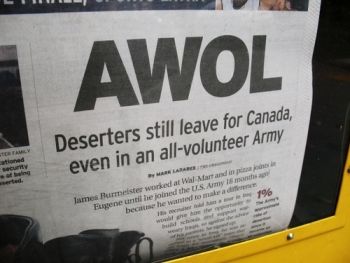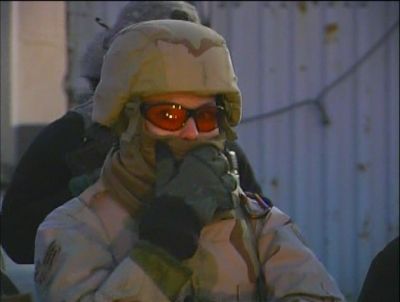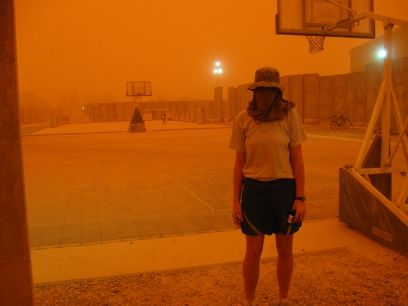
Publisher:
Bonnie King
CONTACT:
Newsroom@Salem-news.com
Advertising:
Adsales@Salem-news.com

~Truth~
~Justice~
~Peace~
TJP
Nov-03-2011 16:32

 TweetFollow @OregonNews
TweetFollow @OregonNews
Exit Free
William Hathaway & D. Rommel Salem-News.comFrom the Book RADICAL PEACE: People Refusing War.
 Photo credit: SmilingMonk. Courtesy: connorboyack.com |
(OLDENBURG, Germany) - The following report was contributed by Naomi Golner, one of the founders of Exit Free, a collective in the USA that helps women leave the military by discharge or desertion.
I've become a criminal for peace. How I got there is a complicated story, beginning when the community college where I teach reduced most of its humanities faculty to adjunct status. It saved them a bundle on salaries. We now teach a maximum of three courses per semester, for a really miserable hourly wage with no benefits. They brought in other part-timers to fill the gaps. So the faculty are now mostly freelancers. I ended up with a lot less money but a lot more time.
Several other women I knew were also broke — laid off or dropped out of the McJob economy. We decided to share the misery and formed a collective to make ends meet. One of us had a big empty-nester house from her divorce settlement, so we all moved in. We buy food in bulk, share two cars, planted a big garden, help each other with the things each of us is good at, sometimes quarrel and cry, but mostly we like being together. We feel stronger now than before when it was each of us alone against the neo-con world.
We decided to do something useful with all our free time: make trouble. There's a military base nearby, and several of us knew soldiers there. The stories they told us about how they were treated made us mad. The things they were being sent overseas to do made us even madder. A lot of them told us they wanted very much to get out of the military, so we decided to help.
 Visit: trineday to order a copy. |
We chose the name Exit Free because it applies to our military work and also to our escaping from our own job prisons as much as possible. Exit Free has been around for three years now. We've got four women out of the war as COs, one as a refuser (but she's still in prison), and nine as deserters. None of the deserters has been caught. We're trying to get more staff so we can open it up to men.
The program starts with encouraging the soldiers to tell what they've been through, to get it off their chests. A lot of women who have served in Iraq and Afghanistan are traumatized by their experiences there. The brutality they were a part of is a continuing pain on their hearts. Some of them are filled with self-loathing even if they didn't personally do anything horrible. They know they were part of a death factory. And they know how much they were hated by the people there. Plus a lot of them were abused by the male GIs. Those guys do things over there they'd never do at home. It's like they got a license to act out their monster fantasies.
Our psychologist runs a therapy group for these women that helps them come to terms with what they've gone through. It's not that they leave it behind. This stuff goes too deep for that. But they can understand the whole thing better, get some perspective, some psychological distance from it.
A lot of other women are terrified of being sent over there. They've heard the stories, they've seen comrades come back wounded mentally and physically. They don't want to hurt other people, and they don't want to be hurt themselves.
Exit Free's program begins with our psychologist helping them understand why they joined in the first place. There are the surface reasons, like job training or getting away from a bad situation at home. But usually there are also deeper psychological motives, and the women need to confront those before they can really be free of it.
 Megan Feldman photo of Kim Rivera, |
As they dig into this stuff, most of them discover that by joining the military they were unconsciously trying to become what their father wanted them to be: a son rather than a daughter. Becoming a soldier is usually one of a long series of attempts to win the old man's acceptance. Some of them have been so busy doing that for years that they don't know who they really are. Their selves have got lost in trying to conform to another person's expectations. Wending their way out of this and recovering their real identity is very difficult.
Rejecting the military can be the first assertion of their authentic personality. It's therapeutic — but painful.
Our patriarchal culture has really mangled us all. But once we've taken a stand against patriarchy and are willing to pay the price of opposing it, in other words, once we've given up on pleasing daddy and put that part of us to rest, then we come into a new sense of personal power. All sorts of possibilities open for us. We can become an Amazon warrior ... an earth mother ... a philosopher ... an artist. We can encompass all of that. But it starts by breaking free, and that's what we're helping the soldiers to do. And ourselves too.
Most of the women have learned first hand the futility of violence. They've seen how it just produces more violence, more broken bodies, broken families, more hatred and revenge. They don't want anything to do with war. Since they've become true conscientious objectors, they have a legal right to be discharged as that, but the military makes it very difficult.
 U.S. Army soldier in Kabul, Afghanistan. |
CO applications for religious reasons have the best chance. Fortunately the local Episcopal priest is a pacifist. She works with soldiers to deepen their spiritual understanding of nonviolence, helps them prepare their applications, writes attesting documents for them, and role-plays interviews with them with the sort of questions the board will ask.
Most of the applications still get rejected, but Jane has got several soldiers free, and that has caused her problems at church. It turns out that the commanding general of the base is a member of the parish. He doesn't attend regularly and wasn't aware that the priest does outreach ministry at Exit Free, but when it finally came to his attention, he got quite upset. First he tried to persuade her to stop, saying she should stick to religion and "render unto Caesar what is Caesar's." He explained that what she was doing was unpatriotic, it was damaging the effectiveness of our fighting forces, and surely she didn't want to do that.
Jane resisted her impulse to tell him that was exactly what she wanted to do, and instead talked about the sincerity of the applicants and how they really did meet the requirements for a CO discharge. She tried to persuade him to get the board to lighten up on its requirements. She invited him to meet with the soldiers and hear their stories first hand. He declined and left.
Afterwards she told us that underneath his condescending paternalism he was clearly a very dangerous man.
The next round got uglier. Suddenly many of the military families canceled their pledges of financial support for the church. Not all, though. A few actually increased their pledges but asked that it be kept quiet.
An article appeared in the local paper about the priest's anti-military activities, and Jane started getting hate calls. Conservative civilians in the parish canceled their pledges, then took out an ad in the paper with the headline, "We support our troops, not our priest."
It totally polarized the congregation, and the financial effects were disastrous. Church income fell by a third. Attendance dropped. People accused Jane of destroying the church.
 U.S. Army soldier on a cold Afghanistan winter day. |
A delegation of "concerned Christians" tried to convince the bishop to fire her or transfer her to a church with no military facilities nearby — "in the interests of fairness." This priest was clearly prejudiced against the military, and the church shouldn't support prejudice.
Fortunately the bishop is a brave man. He refused and said if they were dissatisfied with Jane, they'd have to convince the vestry, a governing board of lay people elected by the congregation, to cancel her contract.
With that began the battle of the vestry. Serving on a vestry is one of those volunteer activities that appeal only to committed church members — lots of work for no pay. The vestry has to work closely with the priest, so the only people who want the job tend to be those who like the priest. Of the four vestry members, only one wanted her replaced. Another didn't approve of her CO activities but felt she had a right to do them. Two shared her pacifist sentiments. (Take a guess what the gender distribution was on this issue. You got it, two and two, men and women.)
Vestry elections were a few months away. The anti-Jane members of the congregation recruited a slate of candidates to "save the church." The pro-Jane members supported the incumbents and other candidates who wanted to keep their priest. The congregation seemed to be about equally divided, so both groups became seized with evangelical fervor and began recruiting new members. Many people associated with Exit Free attended the church already (Jane has a spiritual presence about her that inspires people), but now almost all of us found the Lord and showed up in the pews, some in military uniform. I joined myself — even though I'm really Jewish.
We won the election hands down. Seeing that there were actually more of us than of them was one of the great moments of my life. It filled me with hope. We can change this country.
Since then the general hasn't been to church.
 Female member of the USAF in a severe sandstorm, Ballad, Iraq. |
Soldiers whose CO applications get turned down have three options, all of them terrible. They can try to get a psycho discharge, but it's very hard to act convincingly crazy when they've never felt more sane in their lives. Plus the military can lock them in its own mental hospitals and fill them full of drugs, so if they weren't crazy beforehand, they will be afterwards.
They can refuse to obey orders. If so, they'll be jailed for months, court martialed, then sent to military prison for a year or so, and at the end of the sentence they're given a less-than-honorable discharge.
For people with great inner strength, that can be the right path. They are taking a clear moral stand. But the price they have to pay for that can be crushing. Prisons are terrible places that destroy human beings. It's very easy to get in trouble there and get your sentence extended. Some people never get out. Others emerge broken and embittered.
They can desert. If they're caught, they'll usually get a longer prison sentence than a refuser would. They can reduce the risk of arrest if they leave the country and don't return for many years. At some point after a war, congress usually passes an amnesty allowing deserters to return. But that can be a long wait, separated from their family and cultural roots. It's also difficult to find a country that will grant asylum to a deserter. Traditionally Canada and Sweden have sheltered US deserters, but lately Canada has become less willing to displease Washington. They sometimes send people back to be arrested. Sweden is a long ways away, a strange language, a difficult climate.
Fortunately a new possibility has opened up. We've been able to get several Spanish-speaking deserters into Venezuela. The government there isn't afraid to defy Washington. They're showing great courage in standing up to a massive, multi-level attack by the USA and the old Venezuelan elite who want their power back.
One woman's story, Deeana's, is particularly interesting. She was born in New Jersey, but her family was originally from Puerto Rico. She came to us wanting help with a sexual harassment issue. Her sergeant was hitting on her. When she turned him down, he was convinced that just meant she wanted to be conquered, so he stepped up the pressure to show her his manly strength. He would brush up against her in the hall or touch her at her desk, but he was always careful that no one else could see.
Deeana eventually broke down and told him he was repulsive and disgusting, but rather than chasing him away, that turned him into an enemy. A powerful enemy. He started giving her all the worst work details and inventing reasons to write up disciplinary reports on her. But he made it clear that if she gave in, he would "treat her good." He was really enjoying the whole thing — a sadist. Plus it made his pathetic life less boring.
When she still wouldn't put out, he accused her of having an affair with a woman sergeant in the same company who was pretty clearly lesbian. Deeana didn't even bother to deny it, just walked away.
Then something weird happened. The woman sergeant actually did start hitting on her. She said she knew what the guy was up to and since she was a rank higher than he, she could protect Deeana from him ... if Deeana was nice to her.
Deeana felt like she was going crazy. But at least the woman didn't actually grope her. The psychological pressure Deeana was under was enormous. She said it was like being in prison where she had to be somebody's punk just to be protected.
Finally she couldn't stand being grabbed by the man and filed a sexual harassment complaint. At the hearing, his military lawyer pointed out that she had no witnesses to back up any of her claims. He listed all the disciplinary reports the sergeant had filed on her and said her harassment complaint was just her way of getting even with him for reporting her bad behavior.
The board denied her complaint but said they would transfer her to separate the two of them. Deeana got orders for Iraq.
Even if there had been time to file a CO application, it would've almost certainly been denied. Jane made a few calls to ecumenical colleagues in the Catholic Church in Venezuela. Deeana went on leave to Mexico and never came back.
We got a letter for her recently saying she likes Venezuela. She's working as a desk clerk at an international hotel and is glad to be free.
 William T. Hathaway is author of the novels A World of Hurt, CD-Ring,, Summer Snow and a nonfiction book, Radical Peace: People Refusing War. He also wrote the screenplay for Socrates, an educational film starring Ed Asner that was broadcast on PBS.
William T. Hathaway is author of the novels A World of Hurt, CD-Ring,, Summer Snow and a nonfiction book, Radical Peace: People Refusing War. He also wrote the screenplay for Socrates, an educational film starring Ed Asner that was broadcast on PBS.
Hathaway began his writing career as a newspaper reporter in San Francisco, then joined the Special Forces to research a book about war. Based on his experiences on a combat team in Vietnam, A World of Hurt won a Rinehart Foundation Award for its portrayal of the psychological roots of war.
After the war Hathaway became a peace activist. In his latest book, Radical Peace, he wrote, "Since then my books and articles have centered on this theme, as do many of my nonwriting activities. It's become my beat, as they say in the newspaper business." A selection of his writing is available at http://www.peacewriter.org. You can drop William an email at this address: william.hathaway@ewetel.net
"Exit Free" is a chapter from RADICAL PEACE: People Refusing War, which presents the experiences of war resisters, deserters, and peace activists from the USA, Europe, Iraq, and Afghanistan. Recently released by Trine Day, it's a journey along diverse paths of nonviolence, the true stories of people working for peace in unconventional ways. Other chapters are posted on Salem-News.com and on a page of the publisher's website at http://media.trineday.com/
William T. Hathaway's previous book, SUMMER SNOW, is the story of an American warrior in Central Asia who falls in love with a Sufi Muslim and learns from her an alternative to the military mentality. Chapters are posted at www.peacewriter.org. His other books include A WORLD OF HURT (Rinehart Foundation Award) and CD-RING. He is an adjunct professor of American studies at the University of Oldenburg in Germany.
 |
 |
 |
 End Israel's Unwarranted Murder of Kids |
Articles for November 2, 2011 | Articles for November 3, 2011 | Articles for November 4, 2011



Salem-News.com:
Quick Links
DINING
Willamette UniversityGoudy Commons Cafe
Dine on the Queen
Willamette Queen Sternwheeler
MUST SEE SALEM
Oregon Capitol ToursCapitol History Gateway
Willamette River Ride
Willamette Queen Sternwheeler
Historic Home Tours:
Deepwood Museum
The Bush House
Gaiety Hollow Garden
AUCTIONS - APPRAISALS
Auction Masters & AppraisalsCONSTRUCTION SERVICES
Roofing and ContractingSheridan, Ore.
ONLINE SHOPPING
Special Occasion DressesAdvertise with Salem-News
Contact:AdSales@Salem-News.com

Terms of Service | Privacy Policy

All comments and messages are approved by people and self promotional links or unacceptable comments are denied.
[Return to Top]
©2026 Salem-News.com. All opinions expressed in this article are those of the author and do not necessarily reflect those of Salem-News.com.